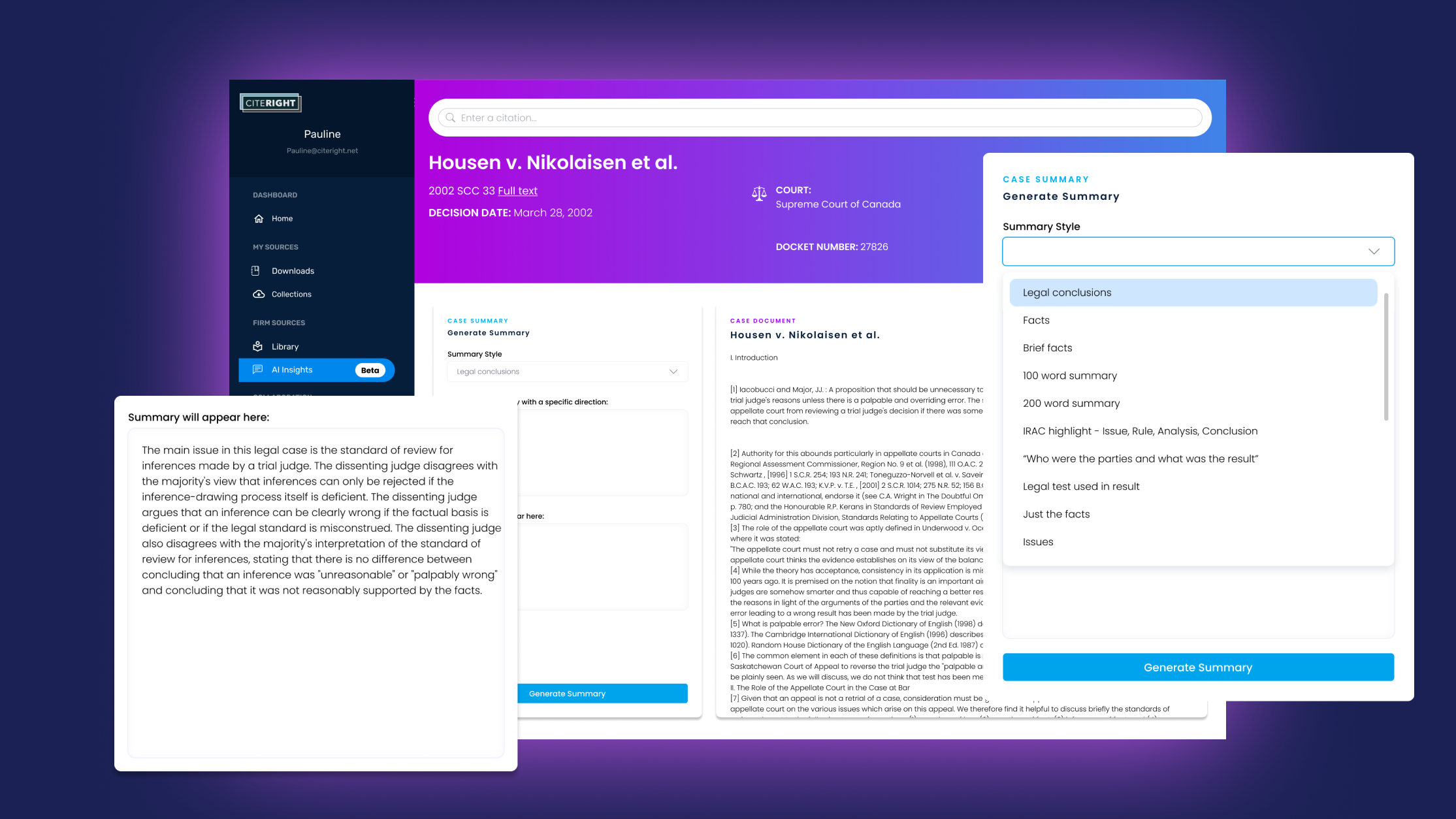Last September, two litigation-focused Canadian legal technology companies, CiteRight and Jurisage, announced their merger, with the promise of combining CiteRight’s litigation drafting program with Jurisage’s AI technology to create an integrated legal research and drafting solution.
Now, in the first application to result from that merger, CiteRight is today launching AI Insights by Jurisage, an AI-powered tool embedded within CiteRight that helps litigation teams quickly find, synthesize, and generate high-quality case law summaries.
Aaron Wenner, CiteRight’s CEO, showed me during a preview demonstration how AI Insights can be used by knowledge management specialists, law librarians, and litigators to instantly generate case summaries, ideally formatted for purposes such as knowledge alerts, hearing preparation, or analyzing cases cited by opposing counsel.
This is based on the same Jurisage technology that is already being used by a number of Canadian law firms and that has been selected by the Incorporated Council of Law Reporting for England and Wales (ICLR) as its official provider of AI-generated case law summaries, Wenner said, only now it is directed embedded within CiteRight.
In his demonstration, Wenner highlighted three features of this tool:
- It is designed to do one thing well. It is focused on a specific use case, that of helping litigators find the words to summarize the cases they already know. “We don’t aim to draft entirely new, earth-shaking arguments,” Wenner said. “Instead, we’re solving the mechanical component to the knowledge work that lawyers are already doing.”
- No chatbots. Wenner said customers have told him that one of their biggest impediments to using generative AI is the need to think of a clever prompt. Rather than require prompts, AI Insights allows the user to select functions from simple drop-down menus. “We’re firm believers in the idea that gen AI tools will only work in legal if they function within existing workflows,” Wenner said.
- No extra cost. This is available to all CiteRight customers, at no extra cost. Wenner said this is because he views AI as an enabling technology to workflows, not an independent value add.
‘Excellent’ Summaries
CiteRight’s core product is research-management software that enables lawyers to save cases from online legal databases and then make them available directly within Microsoft Word. A user can read, review and organize cases, then click a case to cite it automatically, formatted in proper citation style. It also generates tables of authority and keeps copies of all the cases used in document so they are available later on.
What AI Insights brings to that is the ability to generate what Wenner says are “excellent” summaries, and to do so in a variety of formats. From a drop-down, the user can select a summary style:
- Legal conclusions.
- Facts.
- Brief facts.
- 100 word summary.
- 200 word summary.
- IRAC highlight (issue, rule, analysis, conclusion).
- ‘Who were the parties and what was the result.’
- Legal test used in result.
- Just the facts.
- Issues.
Based on interviews with its customers, Wenner said, one example of a key use case for this technology is preparing for oral argument of a previously written brief or memorandum.
That brief is likely to contain numerous citations to cases — all cases the lawyer will have read and synthesized when writing the brief. But when oral argument comes up some months later, the lawyer will want a refresher, a way to easily understand what each of those cases said.
With AI Insights, the user pastes the case citation and selects the form of summary. The user can view the generated summary alongside the case to verify its accuracy, and then paste it directly into a case summary list.
(Wenner said the need to copy and paste the citation will change soon and the ability to generate the summary will be directly integrated within CiteRight.)
The tool is also useful for knowledge management professionals for tasks such as creating case law alerts, Wenner said. When an important case comes in and the knowledge professional wants to alert the appropriate practice group, this tool will make it easy to create the summary.
Wenner said that CiteRight plans to continue to develop additional AI-driven capabilities, but that it will do so in stages, in partnership with its customers.
“The opportunity here is to help law firms access and extract more meaning from their documents more effectively,” he said. “This is a knowledge management challenge that’s wrapped in a user experience problem.
“We think that we’re the company to get there and we have fantastic momentum behind us and fantastic excitement about what it is that we’re building.”
Note: CiteRight is available only for Canadian case law. Wenner said he hopes to expand to the U.S. at some point in the future.
 Robert Ambrogi Blog
Robert Ambrogi Blog